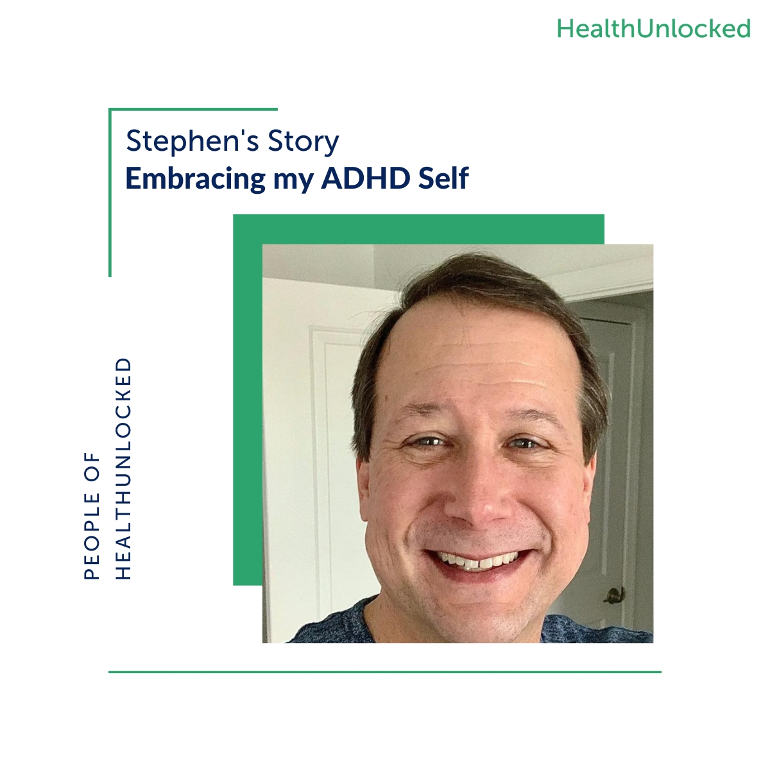At the age of 52 Stephen was diagnosed with ADHD. Read his story of how he came to no longer be afraid of who he is with the help of medication, CBT and online forums.
----------
I’m an adult with ADHD. I’ve been fortunate enough to have a rewarding career as a product manager for the last 32 years. I earned my bachelor’s degree in business and went back to school in 2012 and earned my MBA. I made a career move to a completely new industry four years ago and that’s when my world was turned upside down.
I grew up in the 1970s and 80s, before attention-deficit/hyperactivity disorder (ADHD) was as recognized as it is today. I didn’t know anything about being a “divergent thinker” – someone who explores many creative ideas in a spontaneous and free flowing way. Because I was able to finish school and have a successful career, being ADHD never even crossed my mind.
Then the COVID-19 pandemic hit and my routine was torn apart as my company moved to working from home for more than a year. I had a difficult time adapting to the new normal and a couple of months in, I received my performance review for the previous year. It was the worst review I have ever received and it devastated me. I beat myself up and my self-esteem was on shaky ground.
How could I receive such a bad review with my education and 30+ years of experience? It didn’t make sense. I scheduled an appointment with my doctor the next day. My main deficiencies were in short-term memory, organization, and work prioritization, as well as executive thinking. I thought I would be diagnosed with early onset Alzheimer’s.
On May 25, 2020, I left my doctors office with a formal ADHD diagnosis and a prescription for stimulants, which is the first line of treatment, wondering how it could take 52 years for ADHD to rear its head.
The next day I took my first dose of medication and could not believe the effect. I was calm, the never-ending dialog in my head was quiet, and I was able to focus. I could listen to a conversation or set of instructions, remember them, and execute! WOW! It was life changing.
Along with medication, my doctor recommended cognitive behavioral therapy (CBT) which I’ve embraced. I have a phenomenal CBT therapist who keeps me focused on me.
A couple months later, I was having my weekly meeting with my boss and at the end of the discussion, he said, “I don’t know what you’re doing different, but I like it. Don’t stop.” I had become more task-oriented and was completing my work on time without careless mistakes. It was a glorious moment; I was finally doing something right.
I began learning as much as I could about adult ADHD and suddenly my entire life started to make sense. Maybe that’s why over the years I had projects that I never finished and why it took me 11 years to earn my undergrad degree. I began to participate in online ADHD forums and to meet others who were like me. It was such a relief to finally learn that I’m not the only one who thinks the way I do. I learned that I had been compensating for my ADHD my entire life, I just wasn’t aware of it.
I now have a morning routine that I follow each day so I don’t forget or lose all of my work things. I have places where I put my keys, work badge, and wallet so I don’t wind up trying to find things when it’s time to leave for work. It was eye-opening to say the least.
In one ADHD forum, I came across a post highlighting the book Your Brain’s Not Broken: Strategies for Navigating Your Emotions and Life with ADHD by Tamara Rosier, Ph.D. Her strategies for navigating our emotions and life with ADHD are spot on, and I felt like the entire book was written for me. I couldn’t put it down.
The more I learn about how my brain works versus “neurotypical” people (those who think, perceive, and behave in ways that are considered normal), the more it helps me navigate my career and personal life with a new set of eyes. Not every day is perfect. My symptoms are still present, but I’m now more aware and can correct and redirect if needed. I’ve shared my ADHD diagnosis and what some of my biggest challenges are with my close circle of friends and family, and I’m grateful that most of them are eager to help me succeed. Sometimes a little reminder when a project is coming due helps me remain focused and keeps me from procrastinating until the last minute.
At 55, I’m no longer afraid of who I am and embrace my ADHD self. I am a divergent thinker who is creative and has a life full of challenges that I now embrace rather than beat myself up when my ADHD brain gets the best of me.
----------
Stephen lives in Virginia where he enjoys playing classical piano, hiking and snow skiing in his free time.
----------
Thank you, Stephen, for sharing your story with our readers.
----------
If you have a story to share about participating in a clinical trial, overcoming adversity, or living with a chronic condition, please let us know. We’d love to have you guest blog for us. Guest blogging helps others learn about your struggles and increases awareness and understanding. Contact us to get started sharing your story now!
